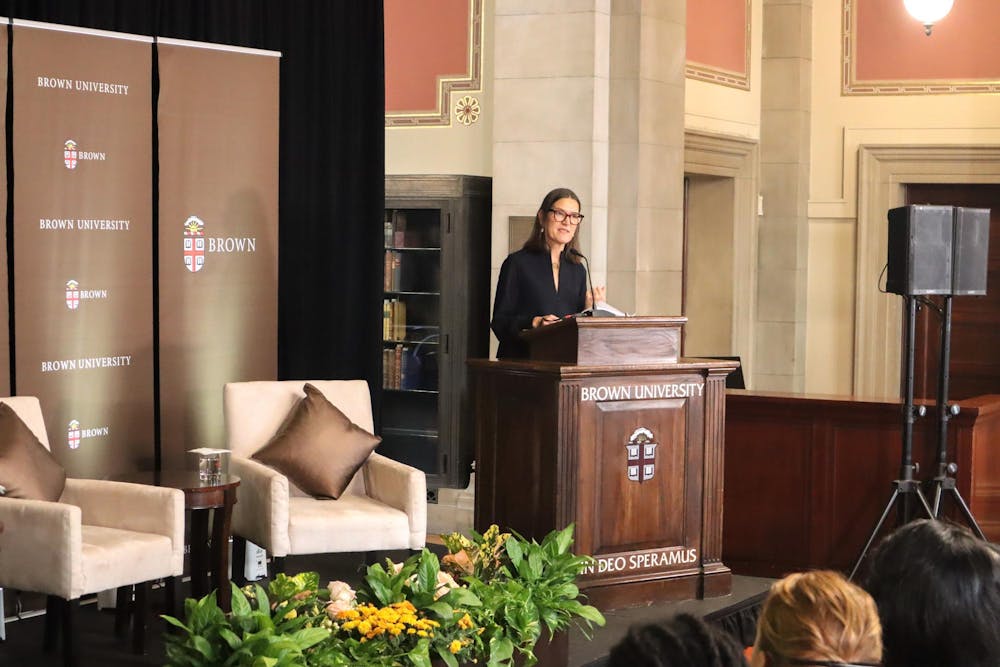Author and reporter Kate Zernike, who writes for the New York Times and was part of a Pulitzer Prize-winning team reporting on Al Qaeda in 2002, gave a talk at the John Carter Brown Library Tuesday evening. Zernike discussed her book, “The Exceptions: Nancy Hopkins, MIT and the Fight for Women in Science,” published in February 2023.
Zernike’s talk, which was moderated by President Christina Paxson P’19 P’MD’20 and co-sponsored by the Office of the President and the Pembroke Center, delved into issues of gender-based discrimination in professional settings. Diane Lipscombe, director of the Carney Institute for Brain Science and chair of Brown’s Task Force on the Status of Women Faculty, also participated in the discussion.
On March 21, 1999, Zernike broke a story for the Boston Globe about a group of 16 women faculty in the science department at MIT who confronted university administrators with evidence of gender-based discrimination. The story quickly “went viral,” prompting responsive action from MIT as well as from universities around the country, Zernike said.
“The Exceptions” tells the story of how molecular biologist Nancy Hopkins, who led the group of 16 faculty members at MIT, noticed a pattern of bias in the treatment she received from her male mentees, colleagues and administrators — her work was often discounted and her voice left out, Zernike said. Hopkins eventually discovered that her male colleagues were given more office and lab space and better pay.
“I asked her, ‘How do you know they get more space?’” Zernike recalled. “She said, ‘Well, I measured it.’”
The tape measure Hopkins used to verify the discrepancy in the space she and other women faculty were provided is currently on display at the MIT museum. To Zernike, that tape measure is a symbol of the struggle women in science face and a testament to the importance of gathering data to “make their case.”
Zernike said that she was initially drawn to the story when she heard that MIT President Charles Vest had admitted to the gender discrimination, citing the findings of an investigative committee chaired by Hopkins.
When she was first assigned the story, Zernike expected a “he-said-she-said” narrative. But this confession, “in my business, was what we call a man-bites-dog story,” she said.
The title of “The Exceptions” carries a twofold meaning, Zernike said. It refers to Hopkins and the 15 other women, all exceptional in their determination, as well as how women in science often reacted to the challenges they faced.
“So many women told me they were able to keep going by telling themselves this was just a one-off — that this was the exception, not the rule,” Zernike said. “Nancy, like the other women at MIT, did not set out to be an activist. She went out of her way to explain what was happening to her as anything but gender discrimination” — but eventually, she ran out of plausible excuses.
Zernike said she began planning “The Exceptions” in 2018, “when the #MeToo movement was surging.” Reflecting on the story she’d broken in 1999, she came to the realization that workplace discrimination and marginalization, on any scale, could be attributed to an underlying cause: “The stubborn suspicion that women just aren’t as intellectually capable as men.”
“The problem was not that girls were not interested in science,” she said. “The pipeline was full, but it was leaking.” Zernike added that women tend to drop out of STEM fields later in their careers due to marginalization.
Emily Sarkisian GS, a biotechnology student, said she was inspired to attend the talk because, while she has multiple “pioneering” female role models in her family, she was the first to go into a STEM field.
“Hearing how the things men do is not necessarily out of malice, but something they’ve been conditioned to do, or what the prevailing culture has told them to act like — I found that really interesting,” Sarkisian said.
Dean of Engineering Tejal Desai ‘94 P’27 said she decided to attend the talk after receiving a copy of “The Exceptions” from one of the women faculty members part of the MIT group Zernike originally reported on. Desai said she found the book “compelling and inspiring.”
“Nancy Hopkins had that self-doubt that I think all of us have — ‘What am I missing? I shouldn’t be here,’” Desai said. “It’s something we have to collectively address. It doesn’t matter what level you’re on.”
Despite the challenges women still face, data-driven investigations into gender-based discrimination have heightened the visibility of these issues, Zernike said.
“The stories in my book,” she said, “tell us that exceptional women are not the exception.”

Anisha Kumar is the senior editor of community and standards of The Herald's 135th editorial board. She previously served as a section editor covering University Hall and international student life. She is a junior from Menlo Park, California concentrating in English and Political Science who loves speed-crosswording and rewatching sitcoms.





